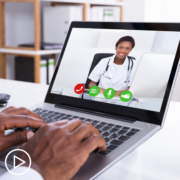Will Telemedicine Improve My Quality of Life with CLL?
Will Telemedicine Improve My Quality of Life with CLL? from Patient Empowerment Network on Vimeo.
How do chronic lymphocytic leukemia (CLL) patients and care partners feel about the impact of telemedicine on quality of life? Watch as a CLL patient and care partner, Bob and Susan, discuss how easier access to blood test results affects patient emotions before and during remote office visits.
See More From the CLL TelemEDucation Empowerment Resource Center
Related Resources:

Will Telemedicine Be a Long-Term Survivorship Tool for CLL Patients? |

Is Remote Monitoring for CLL Patients on CAR T Therapy the Future? |

|
Transcript:
Susan Bottega:
The role of telemed in terms of survivorship I think is a very, very interesting subject. CLL patients are living a very long life these days with the onset of the novel agents that are coming out. Quality of life becomes a very, very important subject for CLL patients. So much of their quality of life is diminished by the visits that they have to make into doctors’ offices.
The anguish that they spend the day before, the sleepless night that accompanies the doctor’s visit. I think that this is extremely important. You’re looking very possibly of at least two days taken out of your life, and if you’re making these visits on a monthly basis or bi-monthly basis or even tri-monthly basis, that’s a long period of time to take out of the span of your lifetime. And as we’re living longer, this becomes more and more important.
You want to have that quality of life, you want to be able to go on vacations. Your vacations can’t be postponed because you have a doctor’s appointment looming in the future. You can take your computer right along on vacation with you and share your vacation with your doctor.
Bob Bottega:
I like that.
Susan Bottega:
I think the anguish that you feel about blood tests is diminished by it. You don’t have to wait to get the results of your blood tests, your blood tests pop right up on your patient portal. You don’t have to sit there and wait in a doctor’s office until you see those results.
Once you see your doctor, you’ve already got your results and you’re calm about it, you’re relaxed because you know what the results are and you can discuss them without having to deal with the anxiety that comes with hearing, “Okay, my white blood cell count has gone up considerably, so how do I calm myself down to discuss this intelligently at this point in time when I’m emotionally so upset over it?” I think these are very, very important things about the quality of your life. How about you, Bob?
Bob Bottega:
I think you said it all.
Susan Bottega:
Don’t I always? (laughter)






